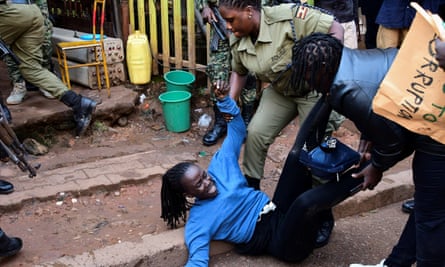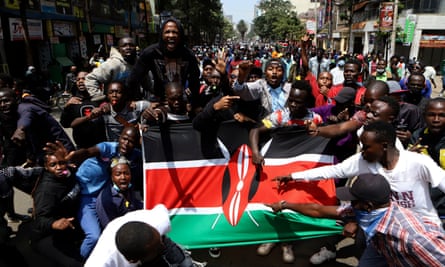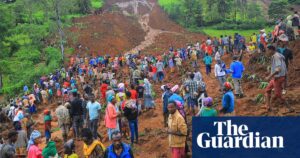Scores of demonstrators have been arrested in the Uganda capital, Kampala, for taking part in a banned rally that has drawn inspiration from the youth-led anti-government protests that have roiled neighbouring Kenya for a month now.
Police stopped and detained people from among small groups of protesters who were marching and shouting anti-corruption slogans in different parts of the city.
The police spokesperson Kituuma Rusoke said authorities would “not allow a demonstration that will risk peace and security of the country”.
President Yoweri Museveni, who has ruled Uganda for almost four decades, had warned in a televised address on Saturday that the demonstrators would be “playing with fire”.
Ugandan authorities on Monday night arrested several MPs of the National Unity Platform, the country’s biggest opposition party, at its headquarters.
As Tuesday’s rallies began, many protesters were arrested in Kampala.

Posters uploaded on social media before the rally urged demonstrators to march to parliament, but roads going there were blocked by police.
Corruption is a big issue in Uganda, and public officials are implicated in many scandals. The country is ranked 142 out of 180 countries in Transparency International’s Corruption Perceptions Index.
The call to action over corruption in Uganda has mainly been organised online, inspired by the huge anti-government uprising that has shaken Kenya’s presidency and captured global attention.
That protest entered its sixth week on Tuesday.
In Kenya’s capital, Nairobi, demonstrators marched along streets of the central business district carrying the Kenyan flag, blowing whistles and chanting “Enough is enough” and “[President] Ruto must go”.
Separate groups, mostly riders of motorcycle taxis commonly known as boda bodas, countered the anti-government protesters to express support for the president. “Let us give our president time,” they said.

Police have been deployed in main towns in the east African country.
Protesters had planned to march to the country’s main airport, Jomo Kenyatta International, but it was not clear if the march was going ahead.
Social media posters urged people to “OccupyJKIA” and cause a “total shutdown”.
Police cautioned against trespassing into the airport. “We urge all individuals participating in demonstrations to … refrain from attempting to enter or interfere with protected areas,” acting inspector general Douglas Kirocho said.
The airport operator Kenya Airports Authority advised travellers to arrive at the airport early to avoid potential delays due to heightened security checks.
The protests started as opposition against a bill to raise taxes, but evolved into calls for reform and accountability, and now a demand for Ruto’s resignation.
The protests have given Ruto his biggest challenge since he became president of Kenya, one of Africa’s biggest economies and most stable countries.
Conceding to pressure from the demonstrations, Ruto earlier this month fired his entire cabinet apart from the foreign minister. On Friday, he nominated 11 people to his cabinet, including six whom he had dismissed.
The protests started peacefully on 18 June but turned violent after one person was killed a few days later. At least 50 people have been killed in the demonstrations so far, according to the Kenya National Commission on Human Rights, with 413 injured, 682 arbitrarily detained and 59 abducted or missing.
Police recently said that criminals had infiltrated the demonstrations.
Over the weekend, a determined Ruto vowed to end the protests.
“I have given a chance to everybody to say whatever they want. It cannot continue like this,” he said while addressing residents of Bomet county. “Going forward, we will protect the nation. We will protect life. We will stop the looters. I want to promise you it’s going to stop.”
AFP contributed to this report.
Source: theguardian.com


















